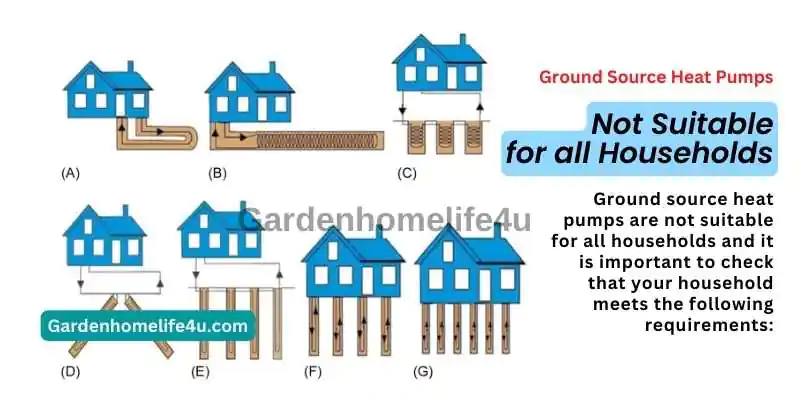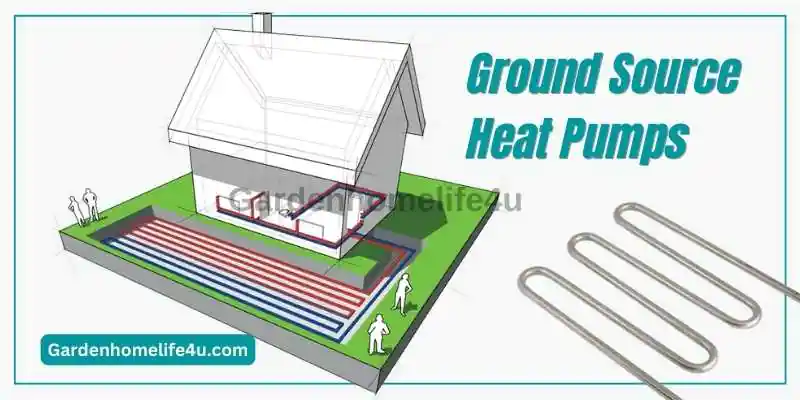As energy costs continue to rise, homeowners are increasingly seeking efficient and cost-effective solutions for heating and cooling their homes. Ground source heat pumps have emerged as a remarkable technology that not only provides reliable climate control but also helps you achieve significant savings on your energy bills. In this article, we will shine some light into the world of ground source heat pumps and explore how they work their benefits, and most importantly, how they can help you cut down on your energy expenses. By understanding the affordability and efficiency of ground-source heat pumps, you’ll be equipped with the knowledge to make informed decisions about your home’s heating and cooling systems. Get ready to discover the path to lower energy bills without compromising on comfort. Let’s dive in and explore the world of ground-source heat pumps.
Heat pumps are typically used in remote buildings where hot water heating systems cannot operate efficiently, such as holiday homes, cabins, and cold storage rooms. For buildings with central heating, the heat pump is often used together with a conventional warm-water system for retrofit applications. Heat pumps are an efficient, reliable, and cost-effective way to heat your home. They are also a more environmentally friendly option than traditional means of heating your house.
Heat pumps can also be used for cooling as well as heating. The only requirement is that the unit must be located in a well-drained area. 
Ground source heat pumps
Ground source heat pumps use an underground loop of pipe to transfer heat from the ground to a central building. They extract heat from the earth and transfer it to the upper levels of a building.
Ground source heat pumps are ideal for heating buildings located in cold areas. Some people choose them over natural gas because they are more eco-friendly since they don’t release CO2 into the air as natural gas does.
A ground source heat pump is a system in which heat from the earth is used to heat buildings and hot water. With these systems, you can be able to use geothermal energy to warm your home or office.
One of the main benefits of using ground-source heat pumps is that they are cheaper than traditional heating methods. Another advantage of this system is that it uses natural energy, reducing its carbon footprint.
Ground source heat pumps do not require a compressor and so they are more efficient than other forms of heating systems. This makes them more suitable for homes and offices where there is limited space for equipment like air conditioners.
Lifespan Cost of a Ground Source Heat Pump
The cost of a ground source heat pump is proportional to the lifespan of the unit. With a typical lifespan of around 15 years, a ground source heat pump starts off with a high initial cost but gradually becomes cheaper as the equipment ages and requires less maintenance. There are several factors that influence the lifespan of a GSHP –
– If you live in an area with extreme temperature fluctuations and weather changes, this can put additional strain on your unit leading to a shorter lifespan;
– The type of ground you are using for your installation;
– The quality and size of insulation that is used in your home.
Use Cases for Ground Source Heat Pump
Ground Source Heat Pump is a type of heating and cooling system that uses the earth as a heat sink to lower air temperature.
Ground Source Heat Pumps are becoming increasingly popular. They are used by homeowners and commercial buildings that can benefit from the decreased costs they bring. They also contribute to lowering carbon footprint since they don’t use fossil fuels as traditional techniques do.
Ground Source Heat Pump is becoming popularly used in many parts of the world because it can provide energy-saving benefits. There are several benefits of this method. For one, it doesn’t require any significant renovations to your home. In fact, you can install a ground source heat pump and reap the benefits almost immediately. It’s also very resourceful for those who may not have access to conventional electricity or natural gas. It also provides some added insulation as well as reduces energy consumption.
Ground Source Heat Pump is a technology that allows heating or cooling by extracting heat from below ground level through pipes surrounded with soil or sand and transferring it to the entire building below ground level either directly or via a refrigerant called brine solution
Ground Source Heat Pump use cases:
– Domestic – it can be used to supplement conventional heating systems, making them more efficient.
– Industrial – it can increase the efficiency of a building by up to 10%.
– Agricultural – this technology is being incorporated by farms in order to harvest higher yields and reduce their carbon footprint.
– HVAC comfort – This design allows for more even distribution of heat throughout the building, increasing comfort and reducing energy consumption.
– Efficiency – The effectiveness of this system makes it a viable option for retrofitting old buildings as well.
Ground Source Heat Pumps: Much Higher initial costs
Ground Source Heat Pumps have higher initial costs than conventional heating systems. Typical installation costs can range from GBP10,000 to GBP20,000 depending on the size of your home and how much digging is involved. Installation is complex and requires digging into the ground to create a loop of pipes connected to a heat pump.
Once installed, maintenance costs are minimal as long as you keep your system in good working order by changing filters regularly and performing regular checks on all components (such as pumps).
The Break-even point is one of the main factors to consider when deciding whether or not a ground source heat pump would be right for your home. If you’re considering getting one installed in an area with high energy bills, break-even could come within a few years if there’s no tax credit available for installing this type of system; however, this will vary from property to property depending on individual circumstances.
Ground source heat pumps: Not Suitable for all Households 
Ground source heat pumps are not suitable for all households and it is important to check that your household meets the following requirements:
- A ground source heat pump must be installed on a property with at least a garden of 100 square meters. If you live in an apartment or flat, you cannot use one of these systems as they do not have any access to the ground.
- You will need enough space in your garden so that it can be dug out and converted into a dugout borehole. This is where the pipes are laid which connect up with the system under your house or building. It’s worth checking if there are any restrictions on digging up land near trees, roads, or other buildings before starting any excavation work because this could cause damage or disruption elsewhere on your property.
Ground Source Heat Pumps: Save you up to 50% 
One of the advantages of a ground source heat pump is that it can save you up to 70% on your heating bills, depending on the heat pump’s efficiency. The higher the COP (the coefficient of performance), the less electricity is required for a particular amount of heat produced. Ground source heat pumps are one of the most efficient forms of heating currently available to homeowners in the UK.
The higher the coefficient of performance, the less electricity is required
The higher the COP, the less electricity is required for a particular amount of heat produced. The higher the COP, the more efficient your system will be. In addition to running more efficiently, however, a high-COP heat pump will also cost you more money upfront and during installation.
Ground source heat pumps: Efficient forms
Ground source heat pumps are one of the most efficient forms of heating currently available to homeowners in the UK. Ground source heat pumps work by using the ground as a source of energy, and transferring this energy into your home. This process is more efficient than other forms of heating such as air or oil because it isn’t dependent on external factors; it is entirely self-sustainable.
Maintenance costs are much lower 
Ground source heat pumps are low maintenance, with no need for an annual service. In fact, many models barely require any servicing at all. As a result, your costs of running and maintaining the system are lower than those of traditional heating systems.
Gas boilers tend to cost around £200 per year in maintenance and oil boilers can be even more expensive. Electric storage heaters have similar costs but they don’t last as long as gas or oil boilers so they’re more expensive to run in the long term.
Ground source heating system costs vary greatly
Ground source heating systems are an important tool in the fight against climate change. They use the free energy of the Earth’s constant temperature to heat and cool a home. However, they aren’t always cheap to run and can vary greatly in cost depending on factors such as ground type and installation size.
It’s important to remember that ground source heating system costs vary greatly and need to be individually designed and installed. This means there will never be one single figure for how much it costs for an individual household – so don’t be put off if you see a price tag of £10k+. It’s worth getting in touch with your local installer or geothermal expert who can help you work out if this technology is right for your home before making any decisions!
Ground Source Heat Pumps are not cheap, but they save much more money on heating bills in long run, compared to conventional systems. Ground Source Heat Pumps are more efficient than air-source heat pumps, because of their increased energy efficiency and flexibility.
Ground Source Heat Pumps are also more efficient than electric heaters/radiators
Conclusion
Ground Source Heat Pumps offer a more efficient, environmentally-friendly heating system that can save money on your energy bills in the long run. However, it’s important to remember that ground source heating system costs vary greatly and need to be individually designed and installed.
FAQ – Ground Source Heat Pumps
Are Ground source heat pumps ( GSHP ) really cheaper and more efficient to run?
In terms of efficiency, GSHPs are generally considered to be one of the most efficient heating and cooling technologies available. According to the U.S. Department of Energy, GSHPs can deliver 3 to 4 units of heat for every unit of electricity used to power the system, making them 300% to 400% efficient.
In terms of cost, GSHPs can be more expensive to install than traditional heating and cooling systems, particularly if you’re retrofitting an existing building. However, they typically have lower operating costs than traditional systems, so over time, the cost savings from lower energy bills can help offset the initial installation costs.
The exact cost savings of a GSHP will depend on a variety of factors, such as the size of the system, the climate in which it’s installed, and the cost of electricity, Gas, and other fuels in your area.
Overall, while the upfront cost of a GSHP will be higher, it’s likely that the long-term energy savings will make it a cheaper and more efficient option in the long run, the jury is still out there though, we don’t have enough data to support any particular argument at this point really.

